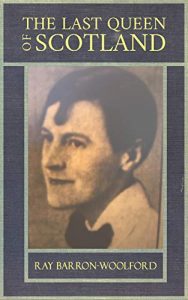
Rejected Book Reivew: The Last Queen of Scotland by Ray Barron-Woolford
I read The Last Queen of Scotland by Ray Barron-Woolford in order to do a review for the Online Book Club. The author, I think, was unhappy with how long he had to wait for a reviewer to choose to read it (it had been sitting for at least a month when I claimed it), that he was paying for the review (that is a choice, many authors submit their books for review where the only thing reviewers get is a free copy of the book), and that he did not get to read my entire review before determining whether or not to approve the payment.
One thing the Online Book Club does is ask reviewers to submit a brief synopsis of the book, specifically calling out spoilers or similar information, that is submitted to the author/publisher to prove they read the whole book. The author/publisher does not get to see the review before it is published. (After it has been published, they can ask that it be made private, as happened with another of my reviews.)
Barron-Woolford determined that I had not read his book. The first reason was that I commented on something that no one else had commented on – the reason for the title (which I thought was an interesting tidbit from the end of the book, since the subject of the biography was a working-class woman with no ties to the monarchy). I was given a chance to reply, and I did, commenting on something else from the book (that I had not mentioned in my review), which is that the author mentions that the subject and her husband are often viewed as two homosexuals who married out of friendship and for protection. He claims that he will present information in the book that would allow the reader to make up their own mind about that point, but he provides no actual information or context that would allow the reader to make any sort of conclusion on that point. Apparently, every other review had mentioned this fact, and now he was convinced I had not read the book but simply other reviews of it. But it was his comments during this whole process that lead me to believe he was simply unhappy with the process.
In the end, I did get paid, but the review did not get published at the Online Book Club site. And that is fine. But since I took the time to write the review, I figured I might as well publish it myself. So here it is, with a few minor changes.
The Last Queen of Scotland by Ray Barron-Woolford is a biography of Kath Duncan, one of Great Britain’s earliest Communist organizers. She was an activist who dedicated her life to supporting the working-class citizens in the areas she lived in. She also happened to be a good friend of Winston Churchill’s wife. In fact, one of her earliest bits of activism was to run Churchill’s campaign in 1917, which garnered him a significant majority in her home city of Kirkaldy, Scotland.
Barron-Woolford has a clear passion for his subject matter, and that is the best part of the book. It is clear that he admires Kath, her husband Sandy, and their friend Fred Copeman. He believes in their integrity as people in addition to their mission of helping the working-class and fighting for unemployment benefits, assistance for families, and access to decent housing. There is, in fact, almost a reverence in the way he talks about their work and their relationships.
Unfortunately, Barron-Woolford allows his passion to overtake his writing. He inserts random commentary into the biography without much rhyme or reason. This is not a critical analysis of certain events or actions, but instead, his emotional reaction to certain events.
In addition, the author does not organize the tale very well. Given that this is a biography, one might expect it to be told in a sequential manner. And, for the most part, each chapter is internally sequential, but the chapters are not sequential with each other. Because of this, he will often refer to an event toward the end of one chapter that he will not actually describe to the reader for another two to three chapters. Because of this, the reader learns about the aftermath and consequences of a certain protest two chapters before learning about the protest itself.
This same flaw applies to characters. Fred Copeman is referred to casually throughout the book, starting in the third or fourth chapter. He is presented as someone the reader should already know, but the author does not actually introduce him until over halfway through the book. In those early references, I kept going back to see if I could figure out who this guy was, and it disrupted the flow of the book.
I give The Last Queen of Scotland two out of four stars. Normally, if I could recommend a book to someone, I would give it three stars but not this time. The list of people I would recommend this book to is two names long. I would recommend it to them because they have a passion for the communist and labor movements and would find the subject matter of the book very interesting. And honestly, as they are both authors, I would probably really enjoy reading their versions of this same biography. But unfortunately, while Barron-Woolford has passion, he does not have the authorial sensibilities to turn his version of Kath Duncan’s story into a good book.




